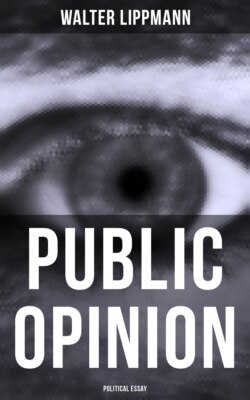Читать книгу Public Opinion: Political Essay - Walter Lippmann - Страница 16
На сайте Литреса книга снята с продажи.
2
ОглавлениеThe editor of the French communiqué tells us that as the battle dragged out, his colleagues and he set out to neutralize the pertinacity of the Germans by continual insistence on their terrible losses. It is necessary to remember that at this time, and in fact until late in 1917, the orthodox view of the war for all the Allied peoples was that it would be decided by "attrition." Nobody believed in a war of movement. It was insisted that strategy did not count, or diplomacy. It was simply a matter of killing Germans. The general public more or less believed the dogma, but it had constantly to be reminded of it in face of spectacular German successes.
"Almost no day passed but the communiqué…. ascribed to the Germans with some appearance of justice heavy losses, extremely heavy, spoke of bloody sacrifices, heaps of corpses, hecatombs. Likewise the wireless constantly used the statistics of the intelligence bureau at Verdun, whose chief, Major Cointet, had invented a method of calculating German losses which obviously produced marvelous results. Every fortnight the figures increased a hundred thousand or so. These 300,000, 400,000, 500,000 casualties put out, divided into daily, weekly, monthly losses, repeated in all sorts of ways, produced a striking effect. Our formulae varied little: 'according to prisoners the German losses in the course of the attack have been considerable' … 'it is proved that the losses' … 'the enemy exhausted by his losses has not renewed the attack' … Certain formulae, later abandoned because they had been overworked, were used each day: 'under our artillery and machine gun fire' … 'mowed down by our artillery and machine gun fire' … Constant repetition impressed the neutrals and Germany itself, and helped to create a bloody background in spite of the denials from Nauen (the German wireless) which tried vainly to destroy the bad effect of this perpetual repetition."19
The thesis of the French Command, which it wished to establish publicly by these reports, was formulated as follows for the guidance of the censors:
"This offensive engages the active forces of our opponent whose manpower is declining. We have learned that the class of 1916 is already at the front. There will remain the 1917 class already being called up, and the resources of the third category (men above forty-five, or convalescents). In a few weeks, the German forces exhausted by this effort, will find themselves confronted with all the forces of the coalition (ten millions against seven millions)."20
According to M. de Pierrefeu, the French command had converted itself to this belief. "By an extraordinary aberration of mind, only the attrition of the enemy was seen; it appeared that our forces were not subject to attrition. General Nivelle shared these ideas. We saw the result in 1917."
We have learned to call this propaganda. A group of men, who can prevent independent access to the event, arrange the news of it to suit their purpose. That the purpose was in this case patriotic does not affect the argument at all. They used their power to make the Allied publics see affairs as they desired them to be seen. The casualty figures of Major Cointet which were spread about the world are of the same order. They were intended to provoke a particular kind of inference, namely that the war of attrition was going in favor of the French. But the inference is not drawn in the form of argument. It results almost automatically from the creation of a mental picture of endless Germans slaughtered on the hills about Verdun. By putting the dead Germans in the focus of the picture, and by omitting to mention the French dead, a very special view of the battle was built up. It was a view designed to neutralize the effects of German territorial advances and the impression of power which the persistence of the offensive was making. It was also a view that tended to make the public acquiesce in the demoralizing defensive strategy imposed upon the Allied armies. For the public, accustomed to the idea that war consists of great strategic movements, flank attacks, encirclements, and dramatic surrenders, had gradually to forget that picture in favor of the terrible idea that by matching lives the war would be won. Through its control over all news from the front, the General Staff substituted a view of the facts that comported with this strategy.
The General Staff of an army in the field is so placed that within wide limits it can control what the public will perceive. It controls the selection of correspondents who go to the front, controls their movements at the front, reads and censors their messages from the front, and operates the wires. The Government behind the army by its command of cables and passports, mails and custom houses and blockades increases the control. It emphasizes it by legal power over publishers, over public meetings, and by its secret service. But in the case of an army the control is far from perfect. There is always the enemy's communiqué, which in these days of wireless cannot be kept away from neutrals. Above all there is the talk of the soldiers, which blows back from the front, and is spread about when they are on leave.21 An army is an unwieldy thing. And that is why the naval and diplomatic censorship is almost always much more complete. Fewer people know what is going on, and their acts are more easily supervised.
